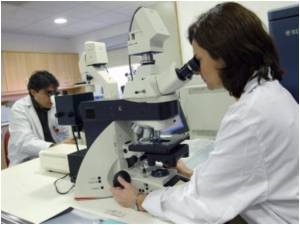Genome-sequencing is getting cheaper and faster, and can eliminate the guesswork in treating cancer by offering personalized clues on how to best attack tumors, US doctors said on Tuesday.

However, controversy lingers over the ethical questions that arise as people begin to learn more about their genetic maps, from concerns over medical privacy to decisions about childbearing and scanning offspring for genetic flaws.
Two studies in the Journal of the American Medical Association detail how one patient's genome led doctors to a different, life-saving leukemia treatment, while a second patient died but left her three children with potentially valuable information about their genetic future.
The study authors said these cases offer hope that as technology gets cheaper and researchers build up more data about cancer and its various mutations, the oncology field will be transformed in the next five to 10 years.
What used to cost tens of millions of dollars and took months, now costs about $40,000 and can offer detailed results in about six weeks, said senior author Richard Wilson, director of Washington University's Genome Institute.
"It has been very eye opening for me in the 10 years that I have been working on cancer genomics," Wilson told AFP.
"It is a complex genetic disease... for the great majority of the cases you are going to want to know exactly what is going on in the genome to cause the disease in order to effectively treat it."
By sequencing the genome of the patient and her tumor and comparing them, doctors found she had an unusual genetic insertion of one chromosome into another, which mimicked the sort of cancer best tackled with chemotherapy instead of a risky bone marrow or stem cell transplant.
"Sequencing the genome of the patient's leukemia cells offered the opportunity to resolve this dilemma in 'real time' and allowed us to make the correct call in recommending further therapy," said the patient's oncologist, Peter Westervelt at Washington University.
The patient came in with survival odds of less than 15 percent, received chemotherapy "and remains in remission 15 months after her diagnosis," the study said.
The second case involved a mother of three who was diagnosed with breast cancer at age 37, then developed ovarian cancer by age 39. She died at 42, after extensive chemotherapy and a recurrence of the ovarian tumor.
However, she had little family history of cancer, leading doctors to suspect she may have had some sort of genetic mutation.
She tested negative for the common BRCA1 and BRAC2 mutations that are often at the root of breast or ovarian cancer, but a sequencing of her entire genome showed "a novel and unexpected mutation in TP53, a well-known tumor suppressor gene involved in DNA repair," the study said.
Doctors said she was likely born with the mutation, which leaves a 50 percent chance of being passed on to her children, potentially handing them a 90 percent risk of developing cancer in their lifetimes.
Wilson said he was unaware of what her family decided to do with the information, due to patient confidentiality agreements, but that doctors recommended her children be tested.
"You always have people who say, 'We should pass this information along, or we shouldn't,'" Wilson said, pointing to the central ethical dilemma of such technological advances.
"The bottom line is that a mutation such as this, which is a clear cancer susceptibility marker, is actionable," he said.
"Your physician, if armed with this information, is going to be much more aggressive in checking for breast cancer early, or ovarian cancer early."
Hundreds of patients in the United States and Britain have had their genomes sequenced, and a handful of companies are speeding ahead with the technology, said Boris Pasche of the University of Alabama in Birmingham.
"The competition is quite fierce, which has benefited the consumers and researchers like us," Pasche said.
Source-AFP
 MEDINDIA
MEDINDIA




 Email
Email









